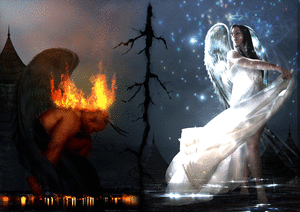Blog Information
- Posted By : UniqueThis
- Posted On : May 30, 2024
- Comments : 1
- Views : 321
- Category : Religion
- Description :
Overview
Throughout history, the concepts of demons and angels have captivated the human imagination, featuring prominently in religious texts, mythology, literature, and art. These celestial and infernal beings represent the eternal struggle between good and evil, influencing not just spiritual beliefs but also cultural, psychological, and social dynamics. This blog explores the roles of demons and angels and how they impact humanity.
The Origins and Roles of Angels
Angels are often seen as messengers and servants of the divine. They appear across various religious traditions, including Christianity, Islam, Judaism, and Zoroastrianism, with some common themes and unique variations.
In Christianity
Angels in Christianity serve multiple roles:
- Messengers: Angels like Gabriel deliver important divine messages, such as the Annunciation to Mary about the birth of Jesus.
- Protectors: Guardian angels are believed to watch over individuals, guiding and protecting them.
- Warriors: Archangels like Michael lead the celestial armies against demonic forces, embodying the fight against evil.
In Islam
Angels in Islam are beings created from light, obedient to Allah's will:
- Recorders: Angels record the deeds of individuals, which are presented on the Day of Judgment.
- Guides: Angels, such as Jibril (Gabriel), deliver revelations to the prophets, including the Quran to Muhammad.
- Protectors: Similar to Christianity, Islam also believes in guardian angels who protect and guide the faithful.
In Judaism
Jewish tradition describes angels as messengers of God (mal'akhim), performing various tasks:
- Intermediaries: Angels facilitate communication between God and humans.
- Guides: Figures like Raphael are seen as healers and guides for individuals on spiritual journeys.
- Warriors: Michael is also significant in Judaism as a protector of Israel and a leader in heavenly battles.
The Nature and Roles of Demons
Demons are often depicted as malevolent entities seeking to harm, deceive, and lead humans away from divine truth. They appear in many cultures and religions, each with its own interpretations.
In Christianity
Demons in Christianity are fallen angels led by Satan:
- Tempters: Demons tempt humans to sin and stray from God's path.
- Possessors: Accounts of demonic possession and exorcism are prevalent, highlighting their direct interference in human lives.
- Adversaries: They are seen as constant adversaries in the spiritual battle against good.
In Islam
Demons (jinn) in Islam are beings created from smokeless fire:
- Tempters: Iblis (Satan) and other jinn tempt humans to disobey Allah.
- Possessors: Jinn can possess humans, leading to destructive behaviors and requiring spiritual intervention.
- Adversaries: They are considered tests for humanity, challenging believers to stay true to their faith.
In Judaism
Demons (shedim) in Jewish folklore are less central but still significant:
- Tempters: They lure individuals away from righteousness.
- Adversaries: Often seen as obstacles in the path of spiritual and moral development.
- Punishers: Sometimes viewed as agents of divine retribution, carrying out punishments for sins.
Cultural Impact
The imagery and narratives surrounding angels and demons have profoundly influenced art, literature, and culture.
Art and Literature
- Medieval Art: Depictions of angelic and demonic battles are common in medieval paintings and sculptures, symbolizing the cosmic struggle between good and evil.
- Literature: Works like Dante's "Divine Comedy" and Milton's "Paradise Lost" explore themes of angelic loyalty and demonic rebellion, reflecting on human nature and morality.
- Modern Media: Angels and demons continue to captivate audiences in movies, TV shows, and books, such as the "Supernatural" series and Neil Gaiman and Terry Pratchett's "Good Omens."
Psychological and Social Impact
The concepts of angels and demons also play a role in shaping human psychology and social behavior.
Psychological Influence
- Moral Framework: Belief in angels and demons often reinforces moral frameworks, encouraging individuals to aspire to good and resist evil.
- Coping Mechanisms: The idea of guardian angels provides comfort and a sense of protection, especially in difficult times.
- Spiritual Warfare: The notion of spiritual warfare can affect mental health, leading to both positive effects (encouragement to strive for righteousness) and negative effects (fear and anxiety over demonic influence).
Social Influence
- Community Building: Shared beliefs in angels and demons can strengthen community bonds and collective identity.
- Behavioral Regulation: These beliefs often underpin societal norms and laws, influencing behavior through the promise of divine reward or punishment.
Conclusion
Angels and demons, as representations of good and evil, play vital roles in shaping human experience. They influence our spiritual beliefs, cultural expressions, psychological well-being, and social structures. Whether viewed as literal beings or symbolic archetypes, their impact on humanity is profound and enduring. As we continue to explore these celestial and infernal figures, we gain deeper insights into the human condition and the eternal quest for meaning and morality.
